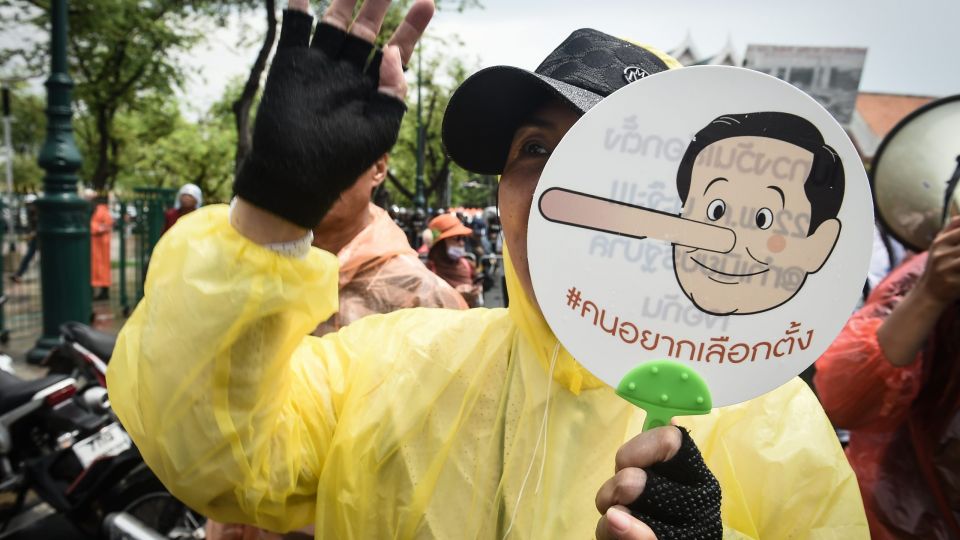May 30, 2018
Four years after it toppled a democratically elected government, Thailand’s military government is fast losing support and has failed to live up to its promises.
There are children in Thailand who have never lived in a democratic country, young adults who have never voted in an election and old jaded journalists who worry about what “Thai-style democracy” might entail.
The military has promised to hold elections in early 2019, but it is just the latest declaration in a series of broken promises. After they took power in 2014, the junta promised to hold elections within a year but the goal posts kept moving and the generals kept ruling.
One must remember when assessing the military government, that the coup was ushered in by a significant sector of the populace – tired after ten years of political instability and spurred on by economic stagnation.
Yet here we are four years later and has anything changed for the better?
Promises of stability and reconciliation
When the military took power, it directly cited the massive street protests of 2013/14 and sporadic incidents of violence as reasons for its actions. The junta under General Prayuth Chan-ocha promised to stabilize the political situation and bring about reconciliation in Thai society.
Four years later and the Thai political situation is extremely stable, mostly because it is banned. Draconian and dictatorial laws have been enacted to ensure that protests and political meetings cannot be conducted without the military’s approval. It is not hard to ensure stability when in possession of all the guns.
The military has also cracked down on dissent, a cliched sentence I have typed numerous times, but one that is nevertheless true.
How has this powerful and authoritarian regime made sure that its rule is supreme and paramount?
By arresting the same 10 student protesters over and over again, arresting the student’s parents, declaring that it would go after foreign critics in exile and yelling at reporters who dare question the righteousness of the regime.
Regarding reconciliation, the military has done an excellent job as well but only in uniting the public against its rule. Indications are that the support that the junta originally enjoyed is on the wane and the public is growing restless with inept and incompetent governance.
In terms of reuniting the fractious political situation in Thailand, the results are unknown because politics is banned.
Economic goals
Another reason the military cited for its seizure of power was a stagnant economic situation, one hampered by years of political protest.
To its credit, the economy did pick up after the 2014 coup. But one feels that any sort of stability would have garnered in the same result.
That said, the plans that the military has implemented to carry the economy forward has fallen a bit flat.
Much was said about the junta’s Thailand 4.0 plan, a nebulous and vague command-style plan to kick start the economy by integrating interconnectivity and massive infrastructure development.
Did that last sentence seem a bit poorly worded and not making much sense?
Don’t worry, that’s because no one actually understands Thailand 4.0, not the economic Tsar that put it in place or his equally confused boss.
Asking Prayuth to explain Thailand 4.0 is like asking a military general to explain complex macroeconomic forces that shape a country.
So anything good happen then?
To be as fair to the junta as possible, the government has taken strong steps to combat corruption – luxury watches aside. The government has convicted several members of the previous government for corruption stemming from a rice subsidy program and has even forced a former premier to take flight over malfeasance charges.
That this government has been accused of corruption should come as no surprise given Thailand’s ranking on the corruption index – but the fact that it has tried to do something is laudable.
The military has also cracked down on migrant worker and forced labour issues after damaging reports from the Associated Press and the Guardian. These steps will likely form the backbone of Thailand’s migrant worker registration program going forward and its ability to fight human traffickers and smugglers.
Next Steps
Ultimately, the only solution for the military is to hold elections. It has taken steps to ensure that its rule is perpetuated even after polls. That is because of the constitution that it drafted – one where the military is able to appoint the entire upper house and has clauses in place for a general to step in and be an outsider prime minister when it is needed.
But even this seems like too much risk for the regime, indications are the 2019 election date will likely be pushed further.


